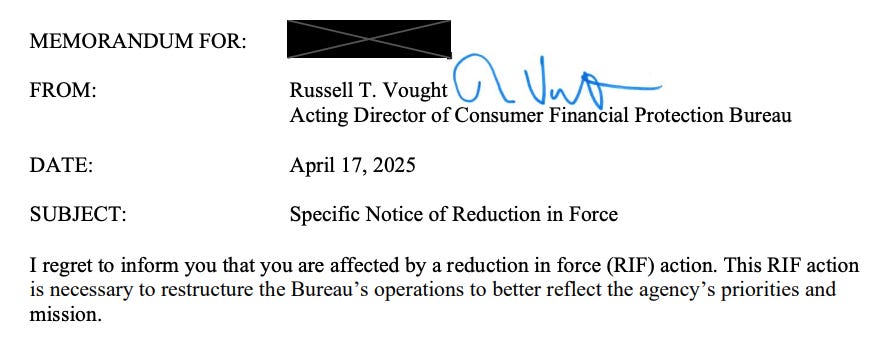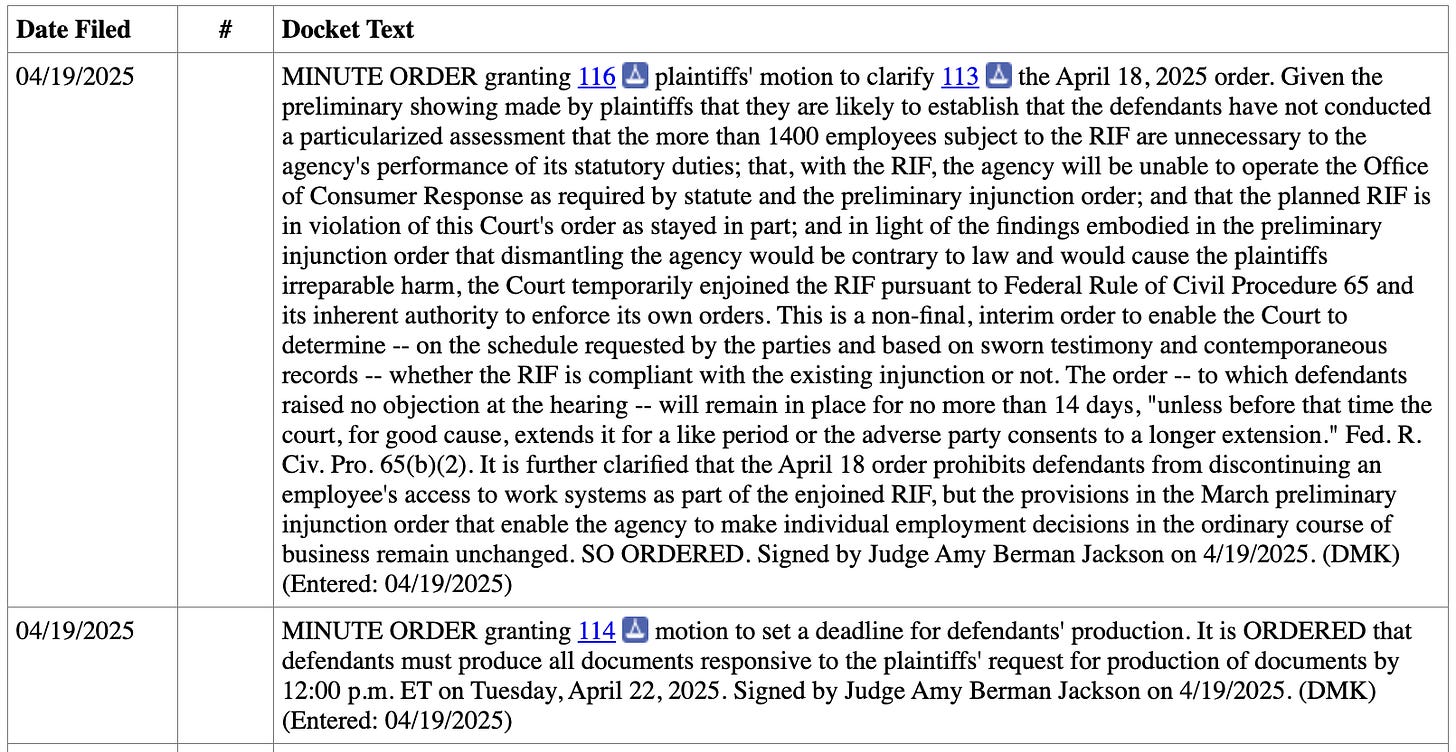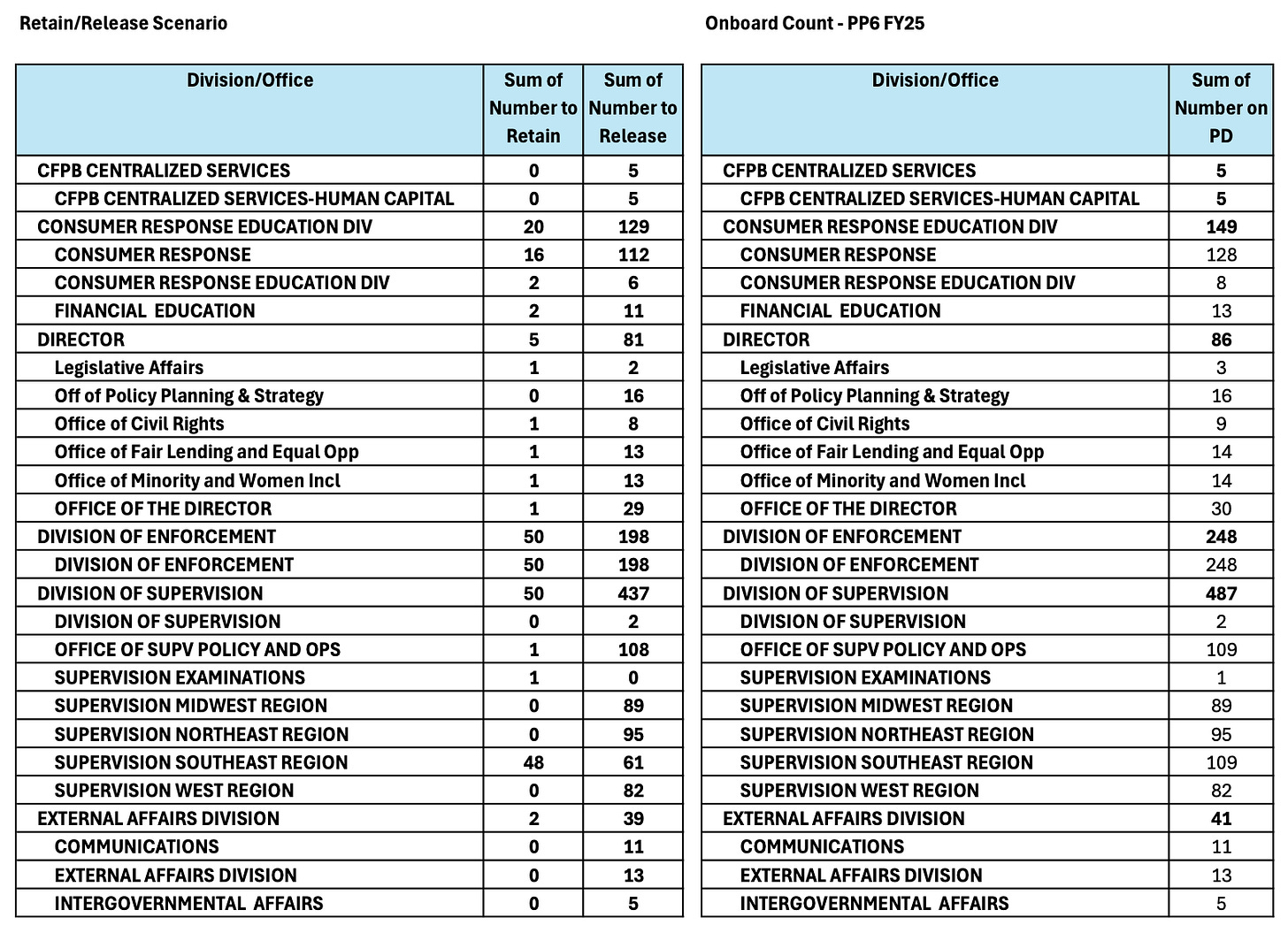Federal judge blocks Trump effort to fire more than 1,400 CFPB employees
Judge Amy Berman Jackson set an April 28 hearing over whether the CFPB's attempted RIF violates a prior court order. “It’s not going to happen in the meantime.“
The Trump administration’s effort to fire more than 1,400 employees from the Consumer Financial Protection Bureau was put on hold Friday, per an order from U.S. District Judge Amy Berman Jackson following a short hearing.
Jackson was direct and abrupt in the hearing, telling the Justice Department lawyers before her that she was “deeply concerned“ about the Reduction in Force (RIF) announced on Thursday and whether it was in compliance with the preliminary injunction in effect in the ongoing case brought by unions challenging, as they put it, the administration’s efforts to “dismantle” the agency.
Under the terms of the RIF, issued by Russell Vought, the acting director of the CFPB who is also the director of the Office of Management and Budget, employees’ last day was to be June 16 — with their access to CFPB devices and systems shut off at 6 p.m. Friday.
The 6 p.m. shut-off “is not happening today,“ Jackson told the Justice Department lawyers, as well as CFPB Chief Operating Officer Adam Martinez, who was in attendance and was asked to address the court at one point during the hearing.
Among other information provided by Martinez at the hearing, he told Jackson that the Office of Personnel Management approved the 60-day notice included in the RIF — which ordinarily would need to provide 90-day notice. Martinez also noted that CFPB sought to give just 30-day notice, but that was not approved.
“I am not going to let the RIF go forward,“ Jackson said, until she is able to decide whether it violates the preliminary injunction, as limited in part by an April 11 order of the U.S. Court of Appeals for the D.C. Circuit.
“A factual record needs to be developed,” she said, setting forward a briefing schedule and a hearing at which the court will “put people on the witness stand,” subject to cross-examination. That hearing will take place at 9:30 a.m. April 28.
As to the RIF, “It’s not going to happen in the meantime,“ Jackson said, noting that a written order would be forthcoming but that her in-court statement’s constituted an oral order as well.
[Update, 8:45 p.m.: Before 5 p.m. Friday, Jackson issued her written order. It concluded:
In her order, Jackson noted that the need to act immediately came, in part, because the court was again “confronted with evidence that gives rise to concerns that there will be no agency standing by the time it gets to consider the merits, by the time the Court of Appeals rules on the legality of the preliminary injunction, or even by the time it holds a hearing on the motion to enforce the Order.“]
[Update, 2:50 p.m. April 19: Since Judge Jackson issued her order, the unions asked Jackson to set a production deadline for the government, the Justice Department announced it was appealing the Friday order, the unions asked Jackson to clarify her Friday order, and the Justice Department filed a motion at the U.S. Court of Appeals for the D.C. Circuit asking it to take action to stop Jackson’s Friday order from remaining in effect.
In response to the two requests before her, Jackson on Saturday set a deadline of noon Tuesday for the government to turn over the requested documents and clarified Friday’s order:
In her clarification order, Jackson noted both that the government had raised no objections to it on Friday and that it was a “non-final, interim order” to allow her to consider and resolve the question before it of whether the RIF violates the existing preliminary injunction.]
The RIF and response
Friday morning’s hearing followed a motion filed by the unions lawyers on Thursday shortly after word of the RIF began being reported. In that filing, they asked the court to hold a hearing on whether the government should be ordered to show cause why the RIF does not violate the preliminary injunction.
Hours later, Jackson scheduled the hearing for 11 a.m. Friday and ordered the government to have someone at the hearing with “personal knowledge” of the RIF and to file information regarding the RIF on the docket by an hour before the hearing.
In that Friday morning filing, CFPB’s chief legal officer, Mark Paoletta, stated, among other claims, “An approximately 200 person agency allows the Bureau to fulfill its statutory duties and better aligns with the new leadership’s priorities and management philosophy.“ Among the documents appended to the declaration was a previously reported April 16 memo from Paoletta laying out the CFPB’s “2025 Supervision and Enforcement Priorities.”
Paoletta also appended cumulative information about the RIF’s dramatic effects on the agency:
Notably, rather than have Paoletta at the hearing as the person with personal knowledge of the RIF, Martinez, the CFPB COO, was present.
At the same time, however, the unions submitted their own declarations as “the scope of the RIFs” become clear, including one from the chief of staff in CFPB’s Office of Consumer Response.
From the start, Jackson made clear her serious concern with what CFPB was seeking to do, laying out the provisions of her injunction as limited by the D.C. Circuit, then noting that the RIF was announced just days after the D.C. Circuit issued its order.
Paoletta’s declaration, Jackson noted, contained no dates about the RIF process, no names of the people involved, and no information about the process to effectuate the RIF.
The timing and speed of the agency’s leadership in implementing and announcing the RIF after the D.C. Circuit’s order, the apparent lack of consultation with managers throughout the agency, and the information set forth in the declaration submitted Friday morning by Paoletta led to Jackson’s statement that she was “deeply concerned” by the RIF.
DOGE discussion
One a declaration filed by the unions on Friday figured prominently into Jackson’s comments at the hearing. It was submitted by a person who stated they were “a member of the CFPB RIF team“ and whose declaration was submitted with a pseudonym because they fear “retaliation.” Among other claims, it noted the need for the OPM exception from the 90-day notice requirement.
The declaration also discussed the involvement of DOGE, the non-department Department of Government Efficiency that is functionally led by Elon Musk, in the RIF:
Jackson asked about that claimed involvement of Gavin Kliger, identified by the Revolving Door Project as a DOGE agent, in the RIF process.
When the lead Justice Department lawyer at the hearing, Chuck Roberts1, could not answer Jackson’s questions about Kliger, nor could the other lawyers at counsel’s table, Jackson called Martinez to provide information to the court.
Martinez said that Kliger was present at times this week, but said that he is an employee of the Office of Personnel Management — although Martinez acknowledged that Kliger “came in” with DOGE.
Next steps
Over the course of Friday’s hearing, the plaintiffs’ request was converted into a motion to enforce the preliminary injunction. Per the schedule laid out by Jackson, the unions will provide a request for production of documents to CFPB on Friday (or at least before Monday), the government will respond to the motion to enforce the preliminary injunction on April 22, and the unions will reply on April 24. Then, the hearing will be held on April 28.
Kliger, Jackson also said, is to attend the April 28 hearing.
When working out the timeline, the unions’ lead lawyer, Deepak Gupta, noted of the documents at issue, “They know what’s in them; we don’t,” in noting that the plaintiffs want an opportunity to provide briefing after they have received the documents they ask for.
“They may or may not know what’s in them,“ Jackson retorted, noting the lawyers’ claimed lack of knowledge about several other areas of inquiry on Friday morning.
Roberts only made his notice of appearance in the case on Friday, listed simply as “counsel” in DOJ’s Civil Division. He only joined the Justice Department this month; he was previously an associate at Jones Day.












Excellent coverage. Another win, and hopefully one that SCOTUS won't gut.
Thanks Dork. Shit is moving WAY too fast